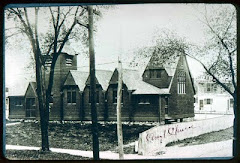After reading this book on Muslim-Christian conflict, I think the author's unstated thesis is: "I can't change other people's attitudes and actions, I can only change mine." Volf's concern is not what Muslims think of us, or even whether they might be inclined to meet us halfway (although that is his hope) in dialogue and mutual tolerance. He can only speak as a Christian. But this limitation exposes the weakness of his argument in an otherwise excellent book. So what if our "circle" includes them; it matters little if their circle excludes us...unless we love them so much that they come around, which appears to be Volf's sincere hope.
In order to promote solidarity, Volf argues that Christianity and Islam have the same God: "Christians and Muslims name in different names and worship in different ways the one true God." However, there is no consensus among Muslims as to whether Allah is the God of Christians (Jews are omitted for the most part from the discussion, as are all other faiths). And some Christians respond to terrorism by concluding "their God can't be ours." Fear of Islam (however justified) does not welcome reconciliation.
A stumbling block to harmony is the Trinity. In order to defend a Trinitarian position against the charge that Christians say but don't mean that God is "one", Volf gives the best explanation I've read of the Trinity. Muslim criticism is toward a misguided view of the doctrine, Volf claims...which even many Christians admittedly get wrong; it's a difficult doctrine to grasp. Volf insists, "the talk about `three Persons' does not subvert God's oneness...God is beyond number" (which seems to imply 1 + 1 + 1 = 1). He speculates that the term "person" may not accurately describe what is largely inexpressible (language has limitations). He goes on to say, "The divine `Persons' are tied together in their mutual indwelling...you cannot say that the act of one is the act of that Person alone; the other two are always `in' the third."
In dealing with stereotypes, Volf spends considerable time unpacking Pope Benedict XVI's volatile comment that Islam is a violent religion...which resulted in some Muslims declaring the Pope must die. If a Muslim cleric said Christians were violent, would there have been comparable rioting in the streets?
My response to Volf's overall argument is that it doesn't matter whether we worship different deities; we can choose to be at peace regardless, with anyone. Volk asks, "Is monotheism by its very nature religiously and politically exclusive?" No, our prevalently Judeo-Christian nation is not at war with India, Japan, or China, yet their religions are even more at odds with ours. Does it really matter (politically) whether or not we worship the same God? Can Muslims and Christians "live under the same political roof and work together for the common good?" Volf asks.
In describing religious differences, Volf omits what I see as the major difference between the two, namely grace: "God demonstrates His love for us in that, while we were yet sinners, Christ died for us," Romans 5:8. How do Muslims satisfy the justice of God? But Volf's book is about political theology, not soteriology. This emphasis on justice plays out with Islam's denial of love toward enemies. They are told to love their neighbor...but what if that neighbor isn't a Muslim? Is God's love conditional? In writing to a Christian audience, Volf rightly charges us: "If you say that Your God is unconditional Love, you should show unconditional love towards Muslims."
Volf envisions a world that can embrace diversity and religious pluralism, and the free exercise of religion, to include the right to witness and to leave one's religion--no problem in America, but a huge problem in some Muslim countries. But the real issue is the human heart: "Bad people, with no intention of doing good, can think alike about God, and that won't prevent them from being at each other's throats." Volf admits, "We fail often, and fail miserably, not because of our convictions, but despite them."
Volf is hoping that Muslims and Christians will decide our religions are not "radically incompatible" and thus choose to coexist for the sake of peace. Otherwise clashes and conflict will continue. Changes in attitudes on a global scale are critical: "Our common future is at stake." There will be no peace unless all nations choose religious tolerance. There must be charitable dialogue, engagement--conversation, not crusade.
A La Carte (March 3)
1 day ago







No comments:
Post a Comment